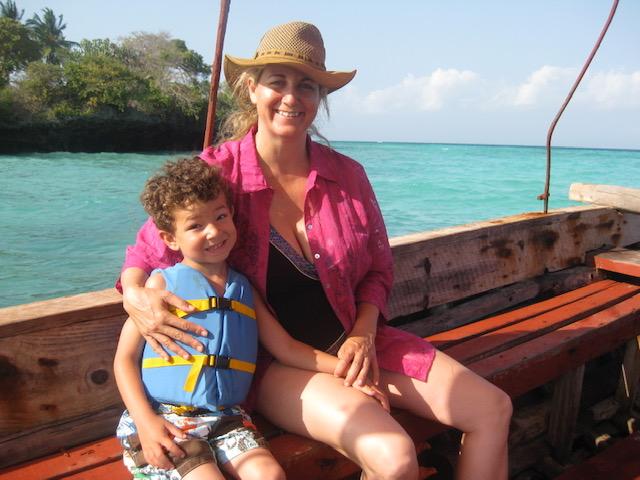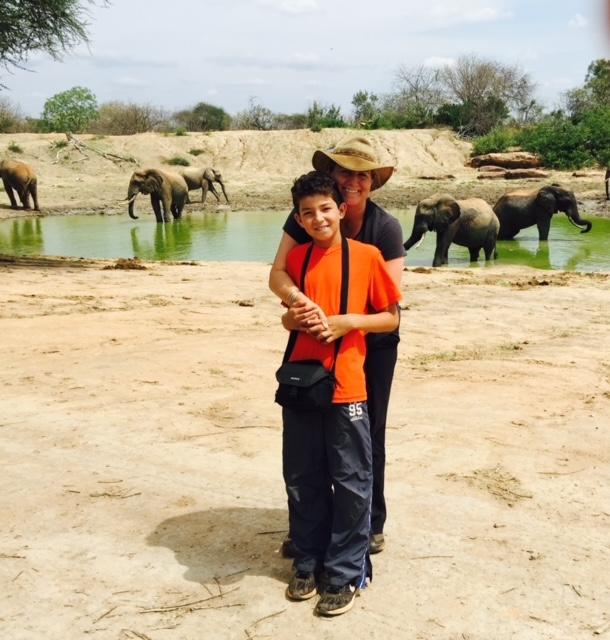The world has seen my breasts! A single working mom, I nursed my baby for two years across 17 countries. I made sure my milk was available on demand whether it was in front of the ancient ruins of Ephesus, on a rickety tuk-tuk in the streets of Cambodia, among a pride of lions in the Masai Mara, or at a busy mall in the Middle East Kingdom of Bahrain. Yet, it wasn’t until I found myself at a rural border crossing in Rwanda, that I realized the mammary gland was a powerful tool for peace.
I was leading a small group of Americans on a trip through East Africa. A hot, humid day, we were squeezed into the back of a stuffy 9-seater passenger van. Even though the van was basic by American standards with its lack of air conditioning and vinyl seats that stuck to the backs of our legs, it probably seemed luxurious in this country where most people made less than $1 a day and survived on subsistence farming.
We had driven 12 non-stop hours through the lush and ruggedly mountainous countryside of Uganda to end our journey trekking for the endangered mountain gorilla in Rwanda. With my 11 month-old son on my lap, I was feeling nauseous from the constant combination of dust and diesel fumes coming through the open windows. We barely made it to the Rwandan border before they closed for the night. The crossing was devoid of other vehicles, and we were the only non-Africans in sight. As our driver went to the customs office to organize insurance for the van, he told us to roll up the windows, lock the doors, and stay in the vehicle until he returned.
I felt apprehensive as I watched him disappear. Although I have experienced many dodgy border crossings, this particular border always made me feel uncomfortable. During the 1994 genocide in Rwanda, this was one of the main crossing points for people fleeing the slaughter. More than a decade later, there still seemed to be a significant difference between the smiling faces on the Ugandan side of the border and the weariness reflected in the Rwandese eyes. In particular, the older Rwandese women seemed to shoulder both the pain of their traumatic history with the daily challenges of trying to survive in the present.
It was nearly 5 p.m. when the sun was setting, and the workday had ended. Dozens of people were making their way on foot across the border after a day spent working on local farms. The women looked exhausted yet stunningly dressed in traditional African print dresses. They walked together, chatting with babies strapped to their backs, baskets of food, or large jugs of water on their heads and a farming hoe in their hands. The men stood around talking in small groups, many drinking locally made beer, watching the women walk by.
Our driver had only been gone a few minutes when a large crowd of aggressive young men and boys surrounded our vehicle. Banging on the sides of the car, motioning for us to roll down the windows, they besieged us from all sides.
“You have money for me?” said one man with a big smile as he tried to wedge his large hand into the crack of the nearly closed window and force it all the way down.
“How are you?” I responded with a confidence I did not feel, trying to change the subject.
“One dollar,” said another man pleadingly, staring deep into my eyes, “Just one dollar for me.”
“I love your country,” I tried again hoping to deflect the intensity that seemed to be growing around us. “Rwanda is beautiful.”
A young boy, no more then eight years old, put a curved serrated knife up to the window and said with a surprisingly forceful voice, “Give me a pen or I will cut you.”
With growing alarm, I watched the women stop walking and start to gather, standing silently behind the men harassing our van. Unsmiling, the women seemed content to watch the spectacle through their tired eyes.
Our vehicle started to sway from side-to-side as the men and boys pounded on the metal demanding we roll down the windows or open the doors. Kids started climbing on top of the hood and up the back of the van trying to get onto the roof rack loaded with our suitcases—protected only with a tarp.
My group looked to me for reassurance, trusting that I knew what I was doing and would keep them from harm’s way. Knowing my reaction was critical to prevent the situation from escalating, I kept an outward appearance of calm.
However, I felt a growing knot of fear for my 11 month-old son. I began to wonder if I could protect him if the crowd got violent. Ever the intuitive, he must have felt my tension and chose that moment to wake up from his nap and root around for his next meal.
As I pulled up my shirt so my baby could nurse, the crowd stopped in shock. All of a sudden, the women surged toward the van, shoving the men out of the way and hitting the children with sticks to force them out of their path. The previously aggressive men broke out in smiles, laughter, and gave each other high fives, pointing at me as they backed off and made way for the women.
Before I could blink, women were pressed up against the windows of the van, pointing to my breasts, pulling out their own breasts from underneath their colorful wraps and even offering me their children to nurse. Two women, laughing and chattering to each other in their local language, put out their hands motioning for me to give them my son to nurse in exchange.
Confused, I couldn’t understand how the atmosphere had morphed from hostility to celebration in mere seconds. A young boy, sensing my bewilderment, came running up to my window with a copy of the daily newspaper. An advertisement for baby formula showed a White woman feeding her baby a bottle.
I pointed out the paper to our driver who had chosen that moment to return.
“The Rwandese do not expect an American woman to nurse her baby. They expect all Westerners to use formula,” he explained. “Seeing you nursing your child makes you not so different.”
In mere moments, I was no longer a stereotyped tourist separated by a fancy vehicle most could never hope to afford, but a mother they could relate to. As the cultural preconceptions dissipated, so did the barriers that pit us apart.
No longer feeling afraid, we rolled the windows down and talked with our new friends. Instead of being asked for money, we were asked how many children we had and would we like to try the local beer?
Ready to leave, we shook people’s hands and waved goodbye as our vehicle pulled onto the road. Silently reflecting while we headed to our lodge, I couldn’t help wondering if peace and understanding between people could really be so simple. I spent years believing that conflict resolution was a complex process of skill and diplomacy, but maybe it’s breasts, not business suits, that need to be around the negotiating table?



Editor’s note: This is one woman’s story about breastfeeding—not every woman can or wants to breastfeed. Mother’s Day Magazine supports feeding babies in whatever way works best for each family. Our hearts go out to families affected by the formula shortage.
Articles are for informational and self-help purposes only. Articles are not meant to provide specific advice for your specific situation. They should not be treated as a substitute for psychological, behavioral health, medical, financial, relationship, or career advice or as a substitute for consultation with a qualified professional. Nothing in any Article is intended as a recommendation or endorsement of any products, services, healthcare provider, opinions or other information.
The opinions expressed by the author and those providing comments are theirs alone and do not reflect the opinions of Mother’s Day Magazine. Mother’s Day Magazine is not responsible for the accuracy of the information supplied by the author. The Terms and Conditions are incorporated herein.

